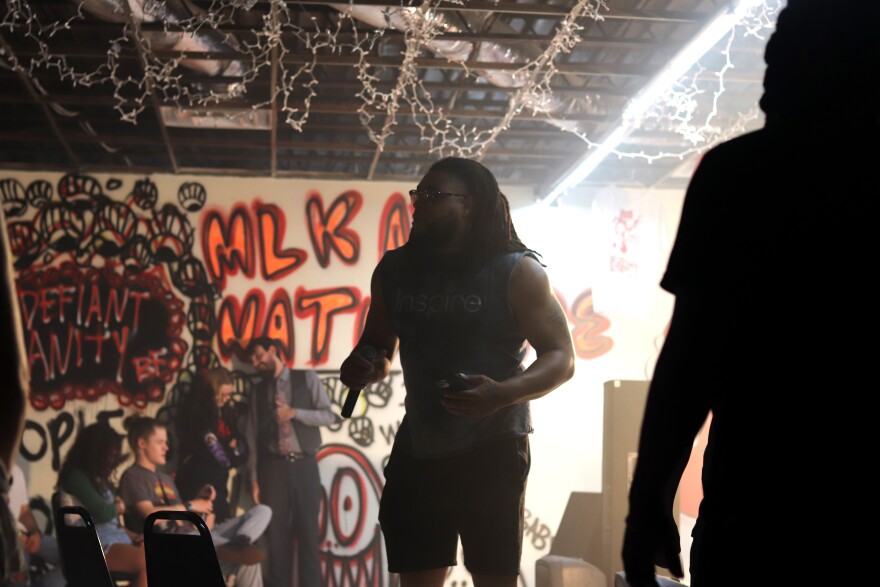Marshall Moses leads the organization Soulbody Cyphers. He has an extensive background in basketball and music. Moses played for OSU from 2007 to 2011, then professionally for international teams for 10 years.
“Basketball brought me to Oklahoma because I went to Oklahoma State University on a scholarship. I’ve always rapped and loved music,” he said.
Moses organized Soulbody Cyphers when the pandemic left him uncertain about his career in basketball. He said he stopped playing because of COVID.
“It was not the easiest time of my life, not just because I was transitioning from basketball, but I had personal things that I was going through.”
Britny Cordera
/
KGOU
For three years, Soulbody Cyphers has advocated for mental health, helped artists develop their careers, and provides school Hip-Hop programming. Moses said mental health awareness is one of the main pillars of the organization, which was created to destigmatize talking about mental health challenges.
“Reducing the stigma is what we mainly focus on,” he said. “The idea of even wanting to talk to somebody or tell somebody what I was dealing with, it just had this major stigma around it. To me, this major energy of like people thinking you’re weak, and always asking what’re going to do about it?”
This year marks the 50th anniversary of Hip-Hop. In the last 50 years, the music genre has created safe spaces to discuss mental health said the co-founders of Hip Hop Psych, a social initiative that aims to improve people’s mental health through mental health.
Britny Cordera
/
KGOU
Hip-Hop is also making therapy more accessible for the Black community. According to the Substance Abuse and Mental Health Services Administration, 39% of Black people in the U.S. received mental health services in 2021 compared to 52% of non-Hispanic white people.
Christopher LeMark founded another mental health and music organization called Coffee, Hip-Hop, and Mental Health.
He told the independent student newspaper The DePaulia that music is the bridge that connects the community with the psychology space when the barriers to access therapy are not just financial but are also due to shame and embarrassment.
Moses said this is the reason why he raps. “How mental health correlates with rap and R&B and singing is it is therapeutic,” he said. Soulbody Cyphers holds events in Oklahoma City, Tulsa, and Wichita.
The non-profit is holding several events this fall. I showed up in September to their Battle Royale at the 405 Nation Headquarters in OKC. Moses said this battle was all about building community and supporting artists.
Britny Cordera
/
KGOU
“We want the community to be interested in us,” he said. “So we create events like this, but also put them in front of big crowds and state-of-the-art productions, so the artists can know what it’s like to be on big stages and prepare for that.”
At the rap battle, MCs got the chance to show off their skills and get constructive feedback from a panel of judges. One artist named Original Flow rapped about the recent killing of an unarmed Black man that happened in his neighborhood.
“I didn’t know who he was, but his story was never told on the news. And the only thing I saw for him were some flowers on the side of the road,” he said. “So now that song is about the loss of Black life and how the injustice still happens when police can open fire and not be held accountable for it.”
Another artist named Zzajsang an original song called “Tired-End’O.” She received a score of three sevens and one eight. An MC named Creo Cash from Tulsa received three nines and one ten for his performance. He says he enjoyed receiving honest feedback from the judges.
Britny Cordera
/
KGOU
“I like that I got two nines. It means there’s always room for improvement, but for the most part, this is new to me. So I enjoyed myself,” he said.
Moses hopes to expand Soulbody Cyphers events to cities nationwide and internationally. The organization’s next performance will be held in Wichita, Kansas on Nov. 3 at a mental health conference.
